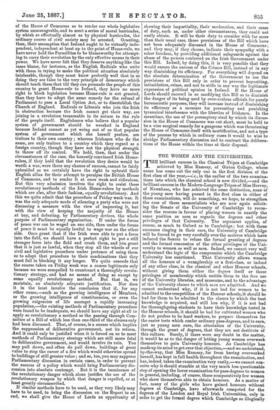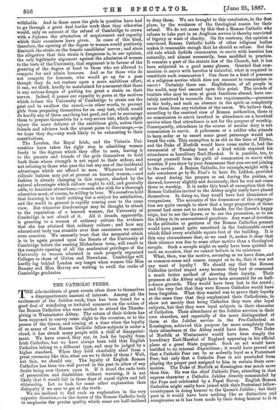THE WOMEN AND THE UNIVERSITIES.
THE brilliant success in the Classical Tripos at Cambridge achieved by Miss Ramsay, of Girton College, whose name has come out the only one in the first division of the first class of the year,—i.e., in the earlier of the two examina- tions into which the classical school is now divided,—and the brilliant success in the Modern-Language Tripes of Miss Hervey, of Newnham, who has achieved the same distinction, none of the young men having passed in the first class in either of these examinations, will do something, we hope, to strengthen the case of those memorialists who are now again solicit- ing the Senate of the University of Cambridge to recon- sider the reasons in favour of placing women in exactly the same position as men as regards the degrees and other privileges of that University. The argument applies, of course, as much to Oxford as to Cambridge ; but with these successes ringing in their ears, the University of Cambridge will be forced to go very carefully over the motives which have induced the Senate to refuse the formal granting of degrees and the formal concession of the other privileges of the Uni- versity to women as well as men. Indeed, we cannot very well understand the logic of the compromise which the Cambridge University has sanctioned. That University allows women all the honours of a wranglership or a first-class, or indeed of any other class, in the classical and other Honour schools, without giving them either the degree itself or those privileges of membership which entitle them to the free use of the University libraries, and museums, and to the advantage of the University classes to which men are admitted. And we cannot understand why, if it is not bad for women to be admitted to the competition of the Honour schools, it should be bad for them to be admitted to the classes by which the best knowledge is acquired, and still less why, if it is not bad for thoroughgoing students to have their knowledge tested in the Honour schools, it should be bad for cultivated women who do not profess to be hard workers, to prepare themselves for the easier tests which confer ordinary pass-degrees, and to earn, just as young men earn, the attestation of the University, through the grant of degrees, that they are not destitute of this culture. Surely, if there were any doubt in the matter, it would be as to the danger of letting young women overwork themselves to gain University honours. As Cambridge has made up its mind to get over that objection,—and we understand, by-the-way, that Miss Ramsay, far from having overworked herself, has kept in full health throughout the examination, and has, indeed, taken the examination very easily,—we cannot con- ceive why it should stumble at the very much less questionable step of opening the lower examination for pass-degrees to women in general, including, of course, those comparatively few women who show themselves able to obtain honours. As a matter of fact, many of the girls who have gained honours without degrees at Cambridge, have afterwards competed for the degrees of the London and Royal Irish Universities, only in order to get the formal degree which Cambridge so illogically
withholds. And in these cases the girls in question have had to go through a great deal harder work than they otherwise would, only on account of the refusal of Cambridge to crown with a diploma the attestation of acquirement and capacity which their examiners have given. In cases of this kind, therefore, the opening of the degree to women would positively diminish the strain on the female candidates' nerves ; and since the allegation that this strain is dangerous is, in our opinion, the only legitimate argument against the admission of women to the tests of the University, that argument is in favour of the granting of the degree at least to those who are allowed to compete for and attain honours. And as for those who do not compete for honours, who would go up for a pass though they do not venture upon a more ambitious effort, it can, we think, hardly be maintained for a moment that there is any serious danger of putting too great a strain on their nerves. Indeed, it passes our capacity to guess at the motives which induce the University of Cambridge to strain out the gnat and to swallow the camel,—in other words, to prevent girls from preparing themselves for an easy test, which would do hardly any of them anything but good, and yet to encourage them to prepare themselves for a very severe test, which might injure the more delicate of the ambitious girls, unless their friends and advisers took the utmost pains to discourage,—as we hope they do,—any work likely to be exhausting to their constitutions.
The London, the Royal Irish, and the Victoria Uni- versities have taken the right step in admitting women freely to the degrees which they offer to men, leaving it to the parents and friends of the girls themselves to hold back those whose strength is not equal to their ardour, and not refusing to those who pass the test any one of the incidental advantages which are offered to men. Whatever brand of ridicule fashion may put at present on learned women,—and fashion is already changing in this respect, abashed by the natural advantages which culture ought to add, and generally adds, to feminine attractions,—women who wish for a thorough education must, of course, be willing to bear. We ourselves hold that learning is in itself nothing but a subject for satisfaction, and the world in general is rapidly coming over to the same view. But whatever disadvantage may be thought to attach to the reputation of a learned woman, the University of Cambridge is not afraid of it. All it dreads, apparently, is granting to a woman of ordinary culture the evidence that she has attained that ordinary culture ; and how any educational body can stumble over that concession we cannot
even conceive. We earnestly trust that the memorial which is to be again pressed upon the Senate of the University of
Cambridge before the ensuing Michaelmas term, will result in the complete opening of all the academical privileges of the University to women educated in such properly organised Colleges as those of Girton and Newnham. Cambridge will hardly lag behind London any longer when women like Miss Ramsay and Miss Hervey are waiting to swell the ranks of Cambridge graduates.



































 Previous page
Previous page